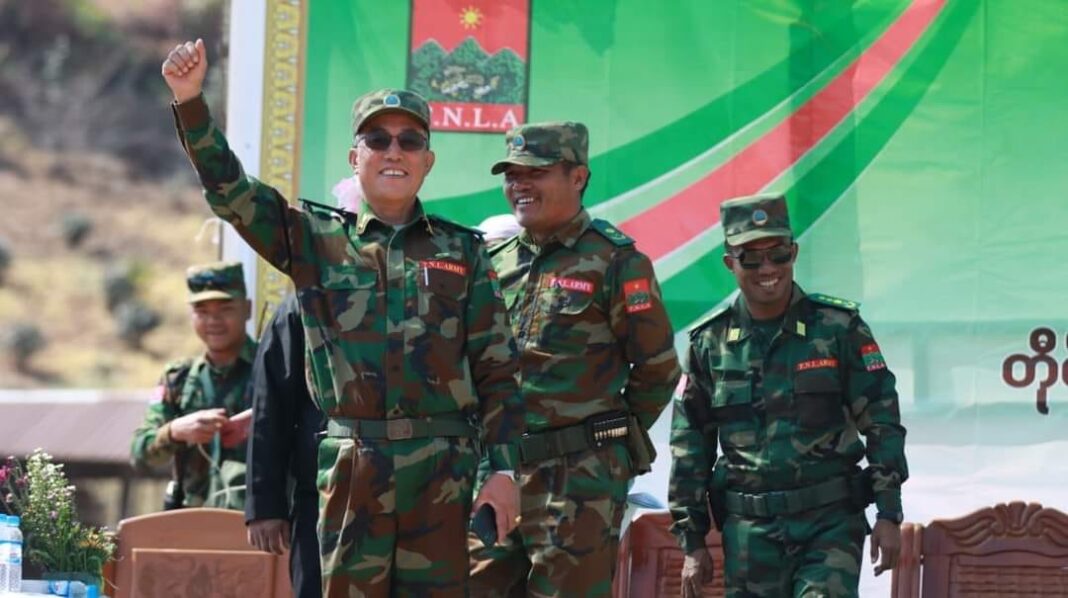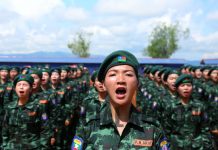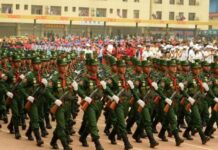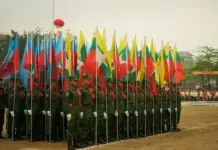On 29 August, the so-called Shweli City Security Committee (as translated from the statement in Burmese), issued an ultimatum that the Ta’ang National Liberation Army (TNLA) immediately end the war to safeguard the Chinese people along the border and workers of Chinese projects within Myanmar, including all Chinese interest.
The TNLA was said to confirm the receipt of the letter and immediately went on with the discussion on how to respond to it.
However, on 31 August, the National Unity Consultative Council (NUCC) issued a letter of rejection emphasizing that Myanmar is a sovereign country and that China or its border provincial authorities don’t have the right to infringe on Myanmar’s sovereignty as a country, or any part of the country’s rights to self-determination.


It seems the NUCC is responding within the capacity of its member of which the Ta’ang people is represented by Ta’ang Political Consultative Council (TPCC). Reportedly, TPCC is composed of the representatives from the Ta’ang political parties, Hluttaw Representatives, Ta’ang social organizations, and Ta’ang political leaders.
The NUCC protest letter writes: “According to the information in the letter (by Shweli authorities), it was written in rude and insulting terms that it will use to instill fear, obedience and disciplined methods, (if TNLA doesn’t comply to the demand).”
Understandably, the argument of whether the Shweli letter addressed to TNLA is fake or genuine has been going on in social media like cacophony, especially among the anti-junta forces, so much so that China’s foreign ministry was asked to verify it.
On August 30, Foreign Ministry Spokesperson Lin Jian’s in his Regular Press Conference was asked by AFP as follows.
“AFP: Some media in Myanmar have reported that the Chinese side has warned the Ta’ang National Liberation Army (TNLA) to stop fighting in the North close to the Chinese border. Can you confirm that China has told the TNLA to stop fighting and what is the situation on the border at the moment?”

“Lin Jian: China is closely following the situation in Myanmar and the developments of the conflict in northern Myanmar, and has been working to promote peacetalks and ceasefire. As Myanmar’s biggest neighboring country, China has all along sincerely hoped that Myanmar will achieve stability and development, and has worked actively to this end. China will continue to play a constructive role for Myanmar’s peace and reconciliation process and promote the deescalation in northern Myanmar.”
As we can see that Lin Jian skirted the question and didn’t admit or deny the central authority involvement regarding the letter, may be because of the diplomatic doublespeak, or perhaps wanting to show its endorsement of the ultimatum as its unmistakable intention also. We may never know.
But the point is that China wants the civil war or revolutionary war to stop at all cost and it is seen as an implementation of Foreign Minister Wang Yi’s “Three Don’ts” that it spelled out to Min Aung Hlaing according to the report of Chinese state media. They are: “China opposes chaos and war in Myanmar, interference in Myanmar’s internal affairs by extra-territorial forces and any attempts to drive a wedge between China and Myanmar.”
Thus, the Shweli ultimatum can be seen as the implementation of Wang Yi’s principles. TNLA has been reprimanded and as an extension, other Three Brotherhood Alliance members, Arakan Army (AA) and Myanmar National Democratic Alliance Army (MNDAA) or Kokang, might have also be delivered a similar message. While there hasn’t been concreted report of such speculation on AA, the MNDAA was said to receive such demand, according to the recent BBC Burmese Section report.
It is also remarkable that the MNDAA started to fly Union flag in Lashio recently together with its own flag, whereas in the recent past it only hosted the MNDAA flag.
In other words, China wants the junta or State Administration Council (SAC) to hold election based on military-drafted 2008 Constitution, which it will help implement it from population census to holding election, coupled with ending the civil war, in order to achieve normalcy in China’s eyes.
The US also seems to be in agreement with what China has in mind according to the observers, as the immediate pressure on TNLA, including the whole seven-member Federal Political Negotiation and Consultative Council (FPNCC) headed by United Wa State Army (UWSA), came only after Wang Yi met its counterpart US National Security Advisor Jake Sullivan. To put it differently, US won’t interfere in Myanmar’s case and would accept it as China’s sphere of influence. After all, the US election is coming soon, apart from Ukraine and Gaza problems which makes South China Sea and Taiwan the back-burner for the time being.
This puts the people of Myanmar’s aspirations in jeopardy while the wish of the regional superpower will likely prevail. In other words, ceasefire at all cost and election at the expense of silent majority to let the military junta maintain its political stake, so long as China’s national interest is served.
Its now up to the people of Myanmar to make a choice, which is going back to 2010 Thein Sein era situation with the military having the supremacy posture, or struggle on to get rid of the tyrannical military junta, once and for all, at all cost.

















Leave a Comments